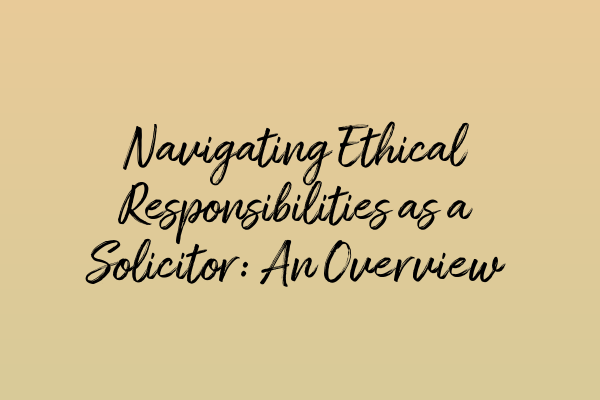Navigating Ethical Responsibilities as a Solicitor: An Overview
As a solicitor, it is crucial to understand and navigate the ethical responsibilities that come with the profession. Whether you are a seasoned solicitor or just starting your legal career, acting ethically is not only a legal requirement but also shapes your reputation and the trust clients have in you. In this blog post, we will provide an overview of the key ethical responsibilities every solicitor must uphold.
The Duty of Confidentiality
One of the fundamental ethical responsibilities of a solicitor is the duty of confidentiality. This duty requires solicitors to keep all client information confidential, except in certain limited circumstances. Confidentiality builds trust between solicitors and clients, ensuring that clients can share their legal issues without fear of their information being disclosed.
Debunking Common Misconceptions about Solicitors highlights the importance of client confidentiality in more detail.
The Duty of Competence
Another crucial ethical responsibility for solicitors is the duty of competence. Solicitors must provide competent legal services, which means having the knowledge, skills, and experience necessary to handle a client’s case. It is essential for solicitors to continuously update their legal knowledge and stay abreast of developments in the law to fulfill this duty effectively.
For a closer look at the Bar Professional Training Course (BPTC), a course that helps in developing the necessary competence, refer to A Closer Look at the Bar Professional Training Course (BPTC).
Conflicts of Interest
Solicitors have a duty to identify and manage any conflicts of interest that may arise in the course of their practice. A conflict of interest occurs when a solicitor’s personal or professional interests conflict with their duty to act in the best interests of their client. It is essential to robustly assess potential conflicts and take appropriate steps to avoid or manage them to maintain integrity and professionalism.
Use of Technology and Confidentiality
In today’s modern legal practice, the use of technology plays a significant role. However, it is crucial to balance the benefits of technology with the duty of confidentiality. Solicitors should take necessary precautions to protect client information when using technology, such as secure communication platforms and data encryption, to ensure client confidentiality is maintained.
To explore the role of technology further, read The Role of Technology in Modern Legal Practice.
Fair and Honest Billing
Another key ethical responsibility for solicitors is fair and honest billing. Solicitors must provide accurate and transparent billing information to their clients, ensuring that clients understand and can assess the costs of their legal services. Billing practices should be fair, reasonable, and in line with the relevant professional guidelines.
Maintaining Professional Boundaries
As a solicitor, it is crucial to maintain professional boundaries with clients, colleagues, and other parties involved in legal matters. This includes avoiding conflicts of interest and refraining from engaging in any behavior that may compromise the integrity of the legal profession or damage the trust clients place in solicitors.
For insights into building a strong professional network, check out Networking Strategies for Solicitors: Building a Strong Professional Network.
Conclusion
Navigating ethical responsibilities as a solicitor is crucial for maintaining professionalism, trust, and a good reputation in the legal profession. By upholding duties such as confidentiality, competence, managing conflicts of interest, using technology responsibly, fair billing practices, and maintaining professional boundaries, solicitors can build strong client relationships and contribute to the integrity of the legal system.
If you are interested in learning more about the legal profession, A Look into Prominent Law Firms in the UK provides insights into some of the leading law firms in the country.


Leave a Reply